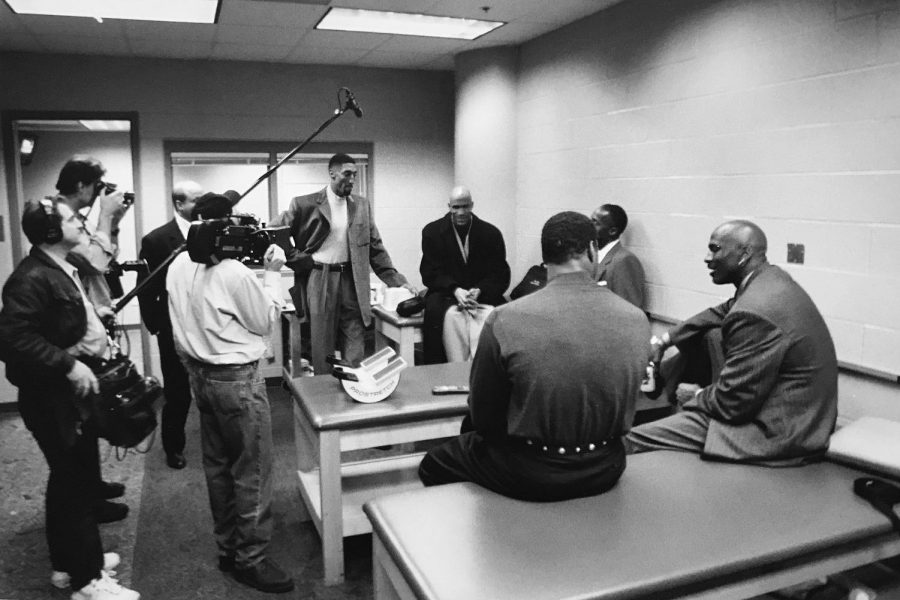While documenting Michael Jordan’s last season with the Chicago Bulls in the late 1990s, Gregg Winik ‘84 and the rest of the NBA Entertainment film crew joked that the footage would become either a “great documentary” or “the greatest set of home movies ever assembled.”
At the 72nd annual Primetime Emmy Awards, the former proved to be true. The Last Dance, the 2020 sports docuseries chronicling Jordan’s career and final season, won the Emmy for Outstanding Documentary or Nonfiction Series. The Emmy win represented 22 years of hard work and perseverance from Winik, an Emerson alum and executive producer of the show, and his crew.
The Last Dance is currently available for streaming on Netflix and the ESPN app.
Winik’s dedication to the project and a lifelong passion for sports production are evident from the praise the show has received.
“The audience reacted to it, the sports world reacted to it, and obviously the awards shows have now reacted to it, and it came out great,” Winik said in a phone interview.
Winik grew up in the suburbs of New York City and came from a family with a background in filmmaking, so he quickly learned he wanted to be a part of the industry. He was also surrounded by sports, since his father was a sports cinematographer and director who owned an independent sports production company.
“My first memories were going to sporting events with [my father] while he was working,” Winik said.
His combined passion for film and sports landed him at Emerson’s film school—now the department of Visual and Media Arts. He frequently contributed to Emerson Independent Video as a member of the production team, where he met classmates Jeffery Wetzel ‘84 and Scott Weinstock ‘84, both of whom he would go on to work with in his career.
Wetzel worked with Winik at NBC Sports for a number of years, covering events like the U.S. Open and the NBA All-Star games together.
“We worked together over the summers when we were in between semesters at Emerson and then we got out of college, we worked together as well,” Wetzel said in a phone interview. “Can’t wait to work with [Winik] again in the future.”

In 1990, Weinstock got a call from Winik about a position on the crew for the show NBA Inside Stuff, which Weinstock fondly recalls in a phone interview as “the greatest work experience of [his] life.”
“We were just a bunch of knuckleheads, just a bunch of really enthusiastic sports guys,” Weinstock said. “We realized what we were doing was going to get a lot of attention, so everyone tried to top the last thing that somebody else did and the level of work we were all putting out was fantastic.”
Winik and Weinstock worked for NBA Entertainment through the ’ 90’s on different projects, one of them being The Last Dance.
While Michael Jordan, the Chicago Bulls, and the NBA approved the filming process for the 1997-1998 season, there was no guarantee the footage would ever be released. Winik would need Jordan’s approval to share the footage, and he would have to find a distribution network to run the docuseries. That, Winik said, ended up being the biggest obstacles that halted this project’s progression.
Due to the mass amounts of footage, the potential lack of profit, and the scale of the story that was being told, Winik felt that there wasn’t an outlet big enough to fully document the legacy of Jordan. Winik said he and the crew struggled to find the “right time” to release the project. But finally, 18 years later, Jordan gave them permission and they landed a deal with Netflix.
After two years of production, the show was released in April on ESPN at the height of the national quarantine.
“The success of The Last Dance can’t be separated from the time and place of the pandemic,” Winik said.
While Winik attributes the docuseries’ success to the increasing demand for in-home entertainment, Weinstock said the success of The Last Dance cannot be separated from Winik.
“He never lost faith that someday it was going to be something and he was able to pick it back up twenty years later,” Weinstock said. “The NBA showed a tremendous amount of faith in him that he would be able to shepherd the project through everything.”
Winik said he learned and developed this determination from a principle that he has been applying to his work since attending Emerson.
“You may not be the smartest, but if you work the hardest you can get a long way,” Winnik said.
His persistence was noticeable to colleagues like Weinstock and Wetzel.
“From the minute I met him, the guy was successful because he had such a great work ethic, he was really passionate about anything he took on,” Wetzel said. “Nobody works harder, and nobody deserves the Emmy more than he does for The Last Dance.”
Winik said The Last Dance not only won him an Emmy but opened many doors for him. He mentioned possibly documenting the NBA’s season in the Orlando “bubble,” the isolated community where the NBA has been playing out the remainder of their 2019-2020 season.
“Sports shows, sports documentaries, sports in general often do not resonate with a wider audience, and obviously this crossed over,” Winik said. “It is quite an honor to be involved in such a project.”